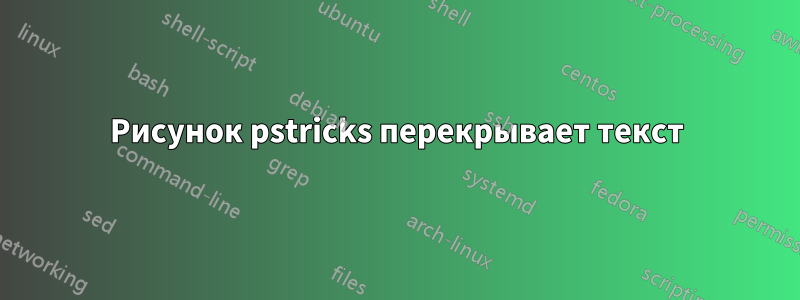
Следующий код создает рисунок, который перекрывает мой текст в LaTeX. Кажется, что latex не создает пространство для этого рисунка. Может ли кто-нибудь мне с этим помочь?
\documentclass[12pt,oneside,english]{book}
\usepackage[T1]{fontenc}
\usepackage[latin9]{inputenc}
\usepackage{geometry}
\geometry{verbose,tmargin=3cm,bmargin=3cm,lmargin=3cm,rmargin=3cm}
\pagestyle{plain}
\setcounter{secnumdepth}{3}
\setcounter{tocdepth}{3}
\usepackage{float}
\usepackage{amsmath}
\makeatletter
%%%%%%%%%%%%%%%%%%%%%%%%%%%%%% Textclass specific LaTeX commands.
\numberwithin{equation}{section}
%%%%%%%%%%%%%%%%%%%%%%%%%%%%%% User specified LaTeX commands.
\usepackage{qtree, amssymb, amsthm, graphicx,graphics, makeidx,esint,bm,pstricks,pst-node,pst-tree,algorithmic,algorithm}
\makeatother
\begin{document}
\begin{figure}[H]
\begin{align*}
\psmatrix
\cnodeput(0,-4){E}{ e_{n-1} }
\cnodeput(-2,-2){A}{ e_{n-2} }
\cnodeput[fillstyle=crosshatch,hatchsep=6pt](2,-2){C}{ e_{n-2}^* }
\cnodeput(-4,0){A1}{e_{n-3}}
\cnodeput[fillstyle=crosshatch,hatchsep=6pt](0,0){A2}{ e_{n-3}^* }
\cnodeput(-6,2){A11}{ \ldots }
\cnodeput[fillstyle=crosshatch,hatchsep=6pt](-2,2){A12}{ \ldots }
\psset{nodesep=3pt}
\ncarc{->}{E}{A}
\ncarc{->}{E}{C}
\ncarc{->}{A}{A1}
\ncarc{->}{A}{A2}
\ncarc{->}{A1}{A11}
\ncarc{->}{A1}{A12}
\endpsmatrix
\end{align*}\caption{\label{fig:Selection-of-edges}Selection of edges in Algorithm}
\end{figure}
this is some text in the document
\end{document}
решение1
Это кажется очень похожим на проблему всреда pspicture накладывает текст на плавающую фигуру
Я внес несколько изменений в ваш код; в частности, я удалил команды align*и psmatrixи вместо них использовал команду , pspictureкоторую можно использовать как
\begin{pspicture}(xmin,ymin)(xmax,ymax)
Команда \psgridполезна во время построения для определения соответствующих значений xmin, xmax, ymin, и ymax.

Код
\documentclass{article}
\usepackage{pstricks,pst-node}
\begin{document}
\begin{figure}
\centering
\begin{pspicture}(-7,-5)(3,3)
%\psgrid
\cnodeput(0,-4){E}{ $e_{n-1}$ }
\cnodeput(-2,-2){A}{ $e_{n-2}$ }
\cnodeput[fillstyle=crosshatch,hatchsep=6pt](2,-2){C}{ $e_{n-2}^*$ }
\cnodeput(-4,0){A1}{$e_{n-3}$}
\cnodeput[fillstyle=crosshatch,hatchsep=6pt](0,0){A2}{$e_{n-3}^*$}
\cnodeput(-6,2){A11}{ \ldots }
\cnodeput[fillstyle=crosshatch,hatchsep=6pt](-2,2){A12}{ \ldots }
\psset{nodesep=3pt}
\ncarc{->}{E}{A}
\ncarc{->}{E}{C}
\ncarc{->}{A}{A1}
\ncarc{->}{A}{A2}
\ncarc{->}{A1}{A11}
\ncarc{->}{A1}{A12}
\end{pspicture}
\caption{\label{fig:Selection-of-edges}Selection of edges in Algorithm}
\end{figure}
this is some text in the document
\end{document}
решение2
Почти все объекты PSTricks имеют ширину и высоту 0pt, чтобы разрешить перезапись по умолчанию. Вам нужно зарезервировать некоторое пространство (горизонтальноивертикально -- ящик), если вы хотите разместить другие объекты вокруг него. Это делается по умолчанию с использованием окружения pspictureили a \parboxили .... чего-либо еще, что резервирует пространство. Вы используете абсолютные координаты в своем примере, поэтому вы не можете использовать его без определения ящика. Вот пример, который использует значение по умолчанию \parbox(использование a pspictureявляется лучшим выбором -- см. ответ cmhughes!)
\documentclass[12pt]{book}
\usepackage{pst-node}
\begin{document}
\begin{figure}[!htb]
\centering
\psframebox{\parbox[b][8cm][r]{0.7\linewidth}{%
\rput[rt](0.7\linewidth,5cm){$\psmatrix
\cnodeput(0,-4){E}{ e_{n-1} }
\cnodeput(-2,-2){A}{ e_{n-2} }
\cnodeput[fillstyle=crosshatch,hatchsep=6pt](2,-2){C}{ e_{n-2}^* }
\cnodeput(-4,0){A1}{e_{n-3}}
\cnodeput[fillstyle=crosshatch,hatchsep=6pt](0,0){A2}{ e_{n-3}^* }
\cnodeput(-6,2){A11}{ \ldots }
\cnodeput[fillstyle=crosshatch,hatchsep=6pt](-2,2){A12}{ \ldots }
\psset{nodesep=3pt}
\ncarc{->}{E}{A}
\ncarc{->}{E}{C}
\ncarc{->}{A}{A1}
\ncarc{->}{A}{A2}
\ncarc{->}{A1}{A11}
\ncarc{->}{A1}{A12}
\endpsmatrix$}}}
\caption{\label{fig:Selection-of-edges}Selection of edges in Algorithm}
\end{figure}
this is some text in the document
\end{document}


